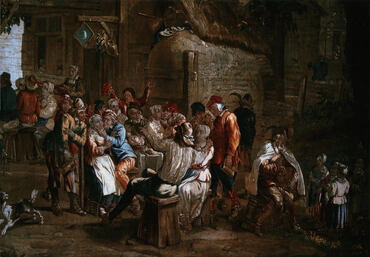8858. A person's whole character is determined by the nature of whatever dominates his life; this is what marks him off from others. His heaven is formed in accordance with it if he is good, or his hell if he is bad. For it constitutes his true will and so the true being of his life, which is unchangeable after death. From all this one may see what the life is like in a person who has been regenerated, and what it is like in one who has not been regenerated.
Arcana Coelestia # 9286
9286. 'Three times you shall keep a feast to Me in the year' means enduring worship of the Lord and thanksgiving on account of deliverance from damnation. This is clear from the meaning of 'keeping a feast' or 'holding a feast' as worshipping the Lord with gladness of mind on account of deliverance from damnation, dealt with in 7093; and from the meaning of 'three times in the year' as a state complete right to its end, for 'three' means complete from the beginning to the end, 2788, 4495, 7715, 9198, and 'year' a whole period, 2906, 7839, 8070. At this point therefore complete and whole deliverance is meant; for 'the feast of unleavened bread' means purification from falsities, 'the feast of harvest' means the planting of truth in good, and 'the feast of ingathering' means the implanting of good from there. Thus complete deliverance from damnation is meant by these feasts; for when a person has been purified from falsities, and after this has been brought by means of truths into good, and is at length governed by good, he is in heaven with the Lord and has accordingly undergone complete deliverance.
[2] The consecutive stages of deliverance from damnation are like the consecutive stages of regeneration; for regeneration is deliverance by the Lord from hell and being led by Him into heaven. For a person who is being regenerated is first purified from falsities, after that the truths of faith he knows are planted in the good of charity, and finally that good itself is implanted in him. When all this has been done the person has been regenerated and he is then in heaven with the Lord. Therefore the three feasts in the year also meant worship of the Lord and thanksgiving on account of regeneration. Because these feasts were established on account of the everlasting remembrance of those things, the worship and thanksgiving are called enduring; for the most important things in worship should endure forever. The things which should endure forever are those which have been inscribed not only on the memory but also on the actual life that is led. When this is so they are said to reign universally with a person, see 5949, 6159, 6571, 8853-8858, 8865.
Feast

There are two kinds of feasts mentioned in the Bible. Some were held to commemorate specific, one-time events, such as the feast Abraham held to celebrate the birth of Isaac. Others are commanded of the people of Israel as annual or repeated events. In general, the one-time feasts represent a conjunction of two spiritual states. We are, for instance, called on to bring our external lives -- what we do and think on a day-to-day basis -- into conjunction with the internal beliefs we hold in the Lord and his desires for good for us. At the times we succeed in doing that, we can experience a sense of joy and fullness that brings to mind a feast. The prescribed feasts represent the joy we can feel in worshiping the Lord -- both in ritual acts of worship and also the worship we offer when we live according to His commandments. These are fitting meanings, both because feasts are joyful and festive and also because of the spiritual meaning of food and drink. Food represents the desire for good, which ultimately comes to us from the Lord. Drink represents the true ideas that help us know what good is and how to act on it. Feasting involves acquiring large quantities of both, which is certainly a joyful thing.






